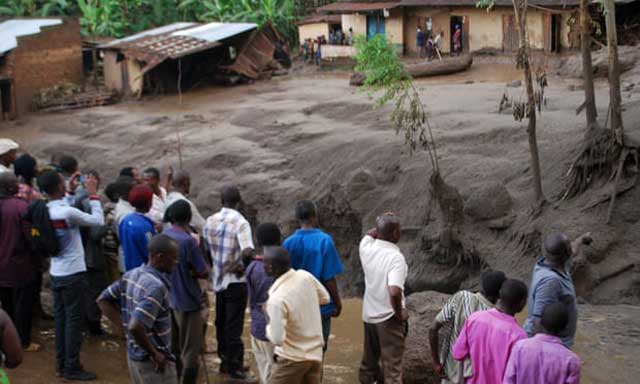
Kampala, Uganda | THE INDEPENDENT | One hundred shillings sounds too small an amount but it is the amount Bududa district has in its budget for disaster preparedness. The disaster-prone district says it needs about twenty-four billion shillings but it cannot raise it locally.
Bududa District Secretary For Social Services, Patrick Meelu says they cannot carry out early warning systems or any form disaster risk reduction awareness because there is no money.
Asked whether one hundred shillings is actually reflected in the district’s budget, Meelu confirmed explaining that it was normal in budgeting process to create a budgetary line to show that there is need.
Meelu, who is also Bududa Vice Chairperson for the ruling NRM government said the idea of disaster preparedness and management is dysfunctional.
Bududa has just experienced a number of mudslides caused by heavy rains. Over four hundred families from Bubiita, Buwali, Bukalasi and Nalwanza were displaced with eight people dead.
The absence of early warning systems was evident as URN drove through Manafa and Bududa districts. River Manafa running from areas hit by mudslides had was almost flooding but there was no sign warning pedestrians and motorist.
The river had affected most parts of the road after Nalwanza near Bukigai market but it seemed normal three days after Nalwanza had experienced mudslides.
Meelu told URN that the only early warning signs had existed shortly after the 2010 mudslide disaster in which 300 people were feared dead.
The absence of a streamlined and funded disaster response mechanism has left most of the victims in more desperate state. Most of the victims had had not received assistance they needed almost for days after the mudslides razed their homes.
They included older persons, people with disabilities, women, poor and children among others. At Bududa district headquarters, there was only one UNHCR white small tent housing two families. Meanwhile, the main hall at the sub county had been turned into a reception area. A few benches in the hall had been joined to form a beds on which some of the victims lay.
A number babies on the mats on the cold floors. Ahamada Watuwa, the Chairman LC III Bubiita Sub County said they had not received any assistance from the Office of Prime Minister.
Asked about early warning and disaster management at the sub county, Watuwa said the technical committees charged with disaster risk reduction and awareness are never on the ground.
Watuwa says there is need to rethink the current method of disaster management and response. He says the mudslides have had a high cost both to the local economy and to individual’s households but no financial resources have been allocated from the central government to finance resilience to these weather extremes.
While the constitution directs the state to institute an effective machinery for dealing with any hazard or disaster arising out of natural calamities or any situation resulting in general displacement of people or serious disruption of their normal life, the interventions by the Office of the Prime Minister have not been to the challenge.
The Civil Society Budget Advocacy Group (CSBAG) recent analysis that Government of Uganda is still spending the bulk of its resources on managing and responding to disaster as opposed to managing and reducing disaster risk.
The government has not established a Disaster Preparedness and Management Commission “to deal with both natural and man-made disasters” as required by article 249 of the constitution.
CSBAG also found that the Public Finance Management Act, (PFM Act, 2015 as amended) provision for funding the management of disaster preparedness, mitigation and prevention is yet to be operationalized.
Section 26of Public Finance Management Act 2015 established a Contingencies Fund which in every financial year was meant to be replenished with an amount equivalent to 0.5% of previous year’s total appropriated national budget. The Fund was to finance Uganda’s disaster response.
******
URN
 The Independent Uganda: You get the Truth we Pay the Price
The Independent Uganda: You get the Truth we Pay the Price


